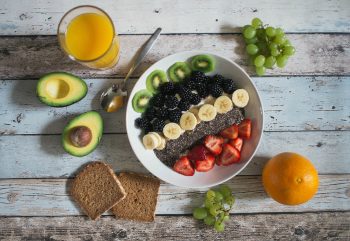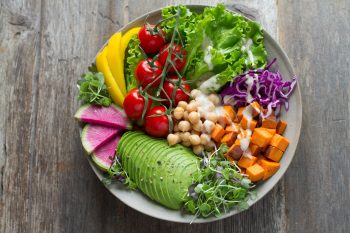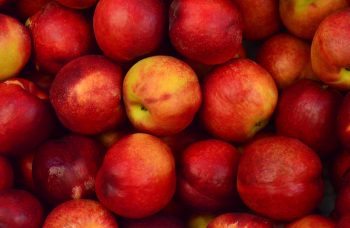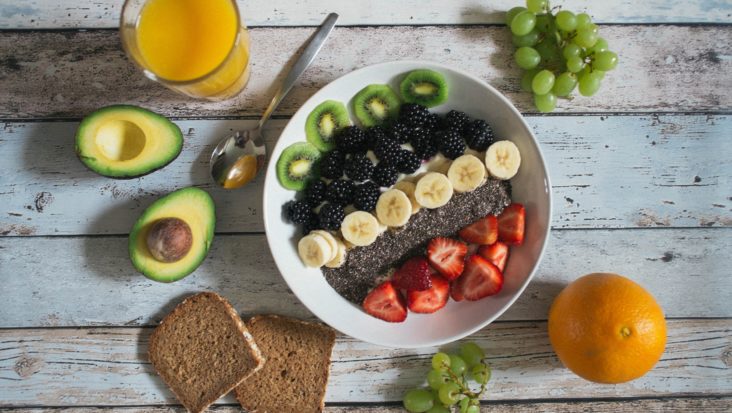What if you found out that there is an easy way to improve your current health, prevent or treat chronic disease, lose weight and enable your gut flora to flourish? There is one: Fiber. I know. Sounds so boring. But nothing could be further from the truth. Fiber, one of the most crucial dietary elements, hides in the shadows of the wholly misguided macronutrient debate of protein versus carbohydrates versus fats. Fiber should be leading the conversation.
The macronutrient way of looking at food is a great topic for another post. For today, know that approximately 100% of North Americans are far exceeding their daily protein requirements (yes, even vegans exceed the RDI for the most part). Protein is not a deficiency in the developed world. The emphasis on “protein-everything” has likely replaced much of the fiber on your plate. Fiber is a deficiency in the western world and one that brings with it huge health costs.
 What exactly is dietary fiber? Fiber is a carbohydrate that contains no calories and passes through the digestive system undigested. It is found only in whole plant foods. Animal products do not contain fiber. Fats contain no fiber. The best sources are: fruits (not juice), vegetables, whole grains, legumes, peas, lentils, nuts and seeds, including chia seeds which have a whopping 5.5 grams of fiber per tablespoon.
What exactly is dietary fiber? Fiber is a carbohydrate that contains no calories and passes through the digestive system undigested. It is found only in whole plant foods. Animal products do not contain fiber. Fats contain no fiber. The best sources are: fruits (not juice), vegetables, whole grains, legumes, peas, lentils, nuts and seeds, including chia seeds which have a whopping 5.5 grams of fiber per tablespoon.
There are two kinds of fiber: soluble and insoluble. Both are amazing and necessary.
Soluble fiber, such as that found in oats, apples, and legumes, easily binds with water to form a gel-like substance in the intestines. Soluble fiber is responsible for lowering LDL and total cholesterol levels, thereby reducing cardiovascular disease risk. It also slows digestion, thereby decreasing the rate of glucose absorption to help maintain proper blood glucose levels, reducing type 2 diabetes risk.
Insoluble fiber, such as the bran layer of cereal grains or a high quality bran blend, passes through the digestive system intact. This helps increase the efficiency of digestion, adds bulk to stools which keeps the colon healthy and prevents or treats constipation. It is also food for your gut bacteria.
 Fiber is a disease-prevention powerhouse while contributing to optimal body functioning. It reduces the risk of some cancers; helps with the maintenance of or loss of weight; lowers cholesterol; controls blood glucose levels; and keeps you regular. This translates to prevention of, or assistance in the treatment of, cardiovascular disease, diabetes, obesity, high blood pressure, constipation, at least some cancers, chronic inflammation and likely autoimmune and brain diseases. How does something that seems just like filler become activated once swallowed? This is where your microbiome comes into play.
Fiber is a disease-prevention powerhouse while contributing to optimal body functioning. It reduces the risk of some cancers; helps with the maintenance of or loss of weight; lowers cholesterol; controls blood glucose levels; and keeps you regular. This translates to prevention of, or assistance in the treatment of, cardiovascular disease, diabetes, obesity, high blood pressure, constipation, at least some cancers, chronic inflammation and likely autoimmune and brain diseases. How does something that seems just like filler become activated once swallowed? This is where your microbiome comes into play.
Fiber is the food of gut bacteria. It is the key to keeping our microbiome healthy and able to prevent the above-mentioned diseases. The fiber we obtain from food is digested by enzymes carried by microbes in our guts as their source of fuel/nutrition. Fiber is fermented by intestinal flora resulting in three main end products of which short chain fatty acids (SCFAs) are one. Let’s briefly look at one SCFA, butyrate, which is the preferred energy source for metabolism in the colon. Butyrate is thought to be the source of the anti-cancer properties we associate with fiber and is used in the treatment of ulcerative colitis. Pectin fibers (apples and citrus fruits) and legume fibers are the best sources for the gut to produce SCFAs. Without enough SCFAs, branched fatty acids, which are toxic, dominate.
 The fact that fiber is the food of our gut bacteria should be a primary reason to make sure you have enough every day. Without enough fiber, we are effectively starving our microbiome with serious short and long-term consequences to our health.
The fact that fiber is the food of our gut bacteria should be a primary reason to make sure you have enough every day. Without enough fiber, we are effectively starving our microbiome with serious short and long-term consequences to our health.
So how much fiber do we need? In North America, the average adult consumes about 15 grams per day. For an adult male, the minimum amount should be 38 grams and for adult females, 25-30 grams. Current low intake levels are at a crisis point. The number of people with cardiovascular disease, diabetes, cancers, chronic inflammation, autoimmune disorders, and brain diseases is growing exponentially and afflicting younger people. A great deal can be attributed to diet and a large part of the solution is so simple.
What you eat and don’t eat makes all the difference. Please rethink the word carbohydrate. It is only in whole, natural carbohydrate foods that fiber is found. Count your grams of fiber and make sure you and your family consume enough every day. Beautifully, fiber-rich foods are also delicious and really easy to get enough of, especially if you eat a plant-based diet. Hint: 1 cup of lentils has 16 grams! Contact me for a complete list.
RESOURCES
1) “Feed Good Gut Bacteria With…Fiber?” http://www.superlife.com/good-gut-bacteria/
2) “Fiber Is Good For You. Now Scientists May Know Why.” By Carl Zimmer http://nyti.ms/2Eujmqy
3) “Short Chain Fatty Acids From Fiber As Critical Signals”, by Jon Lieff, M.D. http://jonlieffmd.com/blog/short-chain-fatty-acids-from-fiber-as-critical-signals
4) “Fiber-Famished Gut Microbes Linked to Poor Health”, by Katherin Harmon Courage https://www.scientificamerican.com/article/fiber-famished-gut-microbes-linked-to-poor-health1/
5) “Add These Fiber-Rich Foods to Your Diet to Fight Inflammation” https://bodyecology.com/articles/add-these-fiber-rich-foods-to-your-diet-to-fight-inflammation
 Colleen Gray-Hewett, B.A.’93, UBC is a long-time dweller of North Vancouver, BC. Her passion for excelling at an active, healthy life well into her 40s lead her to not only adopt, but intensively study the benefits of a plant-based diet and vegan life. This lead to apprenticeships with key mentors such as Victoria Moran of Main Street Vegan Academy in NYC in 2016 and currently with Nicolette Richer of Richer Health (2017/18). Colleen always brings current strategies, an open mind and ideas to her practice – be it with one-on-one coaching, writing or to speaking engagements. She strongly believes that we can prevent and heal our bodies with food, recognize all animals as beings of this planet, and work towards healing the planet. Here are her self-defined bullet points:
Colleen Gray-Hewett, B.A.’93, UBC is a long-time dweller of North Vancouver, BC. Her passion for excelling at an active, healthy life well into her 40s lead her to not only adopt, but intensively study the benefits of a plant-based diet and vegan life. This lead to apprenticeships with key mentors such as Victoria Moran of Main Street Vegan Academy in NYC in 2016 and currently with Nicolette Richer of Richer Health (2017/18). Colleen always brings current strategies, an open mind and ideas to her practice – be it with one-on-one coaching, writing or to speaking engagements. She strongly believes that we can prevent and heal our bodies with food, recognize all animals as beings of this planet, and work towards healing the planet. Here are her self-defined bullet points:
• Plant Strong Health Educator & Coach
• Founder of www.communityvegan.com and www.facebook.com/communityvegan
• Plant-based foodie
• ‘Retired’ Investment Advisor and Certified Financial Planner
• Triathlete (2x Long Distance World Champion 2013 & 2014 and 2x Ironman Kona qualifier)
• Competitive cyclist (and coach); hiker; trail runner; swimmer; SUP’r
• Yogi (250 hrs RYT Vinyasa & Yin)
• Parent of two teens, one dog, 2 cats; Spouse of one
• Traveler with many places still to explore on foot or two wheels
• Coffee aficionado
• Devotee of the sun, rain, earth and animals


Wonderful! Thank you for sharing this. I so love whole foods with fiber.
This is such an important topic, Colleen. Thanks for such a clear educational message!!
At the end of the day, if our gut is unhealthy, WE are unhealthy; fantastic article and oh so important! Thank you so much for sharing and educating!!